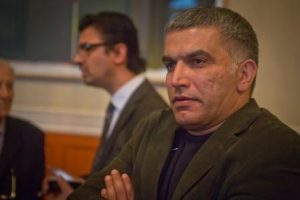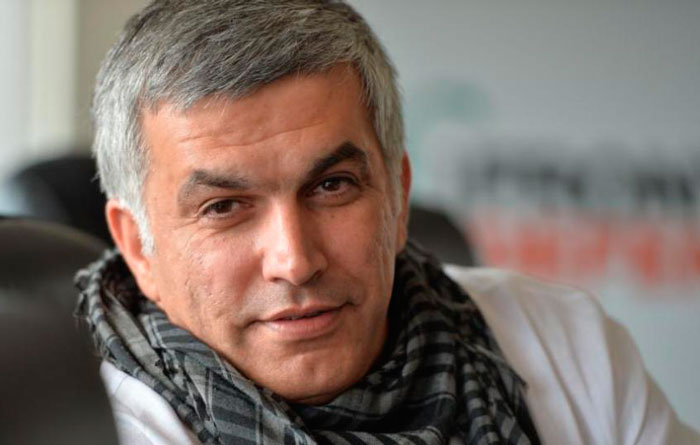Index relies entirely on the support of donors and readers to do its work.
Help us keep amplifying censored voices today.
[vc_row][vc_column][vc_column_text]

Nabeel Rajab at the 2012 Freedom of Expression Awards
Index welcomes the news that Bahraini human rights activist Nabeel Rajab has been freed from prison. Rajab, the president of the Bahrain Center for Human Rights and an Index on Censorship Freedom of Expression Award winner in 2012, had been held since 2016 and convicted of offences including “spreading fake news”.
Rajab had tweeted about torture in Bahrain’s jails and had criticised the war in Yemen. As Index wrote during one of his many appeals: “Those are not crimes. Opinions are not crimes.”
Rajab has suffered relentless harassment since his involvement as a peaceful activist during the Bahrain uprising in 2011, during which he was in and out of prison on numerous occasions. He was then in prison on a continual basis from June 2016, and was sentenced in all to seven years in prison across two separate trials. In February 2018 he was sentenced to five years in prison for tweeting, which was added to a two-year conviction in June 2017 for “broadcasting fake news” relating to television interviews he gave in 2015.
On Tuesday, Rajab’s lawyer said he would serve the remainder of his sentence in a non-custodial setting.
“This is amazing news. Index on Censorship has been pushing for this for a long time,” said Rachael Jolley, editor-in-chief at Index.
But while we welcome news of his release and reunion with his family, we still demand that all charges are dropped against Rajab, as well as all others who are imprisoned in Bahrain simply for their views and advocacy.
This year, one of the co-winners of the Index on Censorship Freedom of Expression Awards Campaigning category was Sayed Ahmed Alwadaei, a Bahraini activist currently living in exile in the UK who is the director of advocacy at the Bahrain Institute for Rights and Democracy. As Alwadaei said when accepting the award in April:
“The price for expressing yourself in Bahrain remains very high. I myself ended up in prison for speaking to the press during the Arab Spring.”[/vc_column_text][/vc_column][/vc_row][vc_row][vc_column width=”3/4”][/vc_column][/vc_row]
[vc_row][vc_column][vc_column_text]13 September 2019
H.E. Ali bin Mohammed Al-Rumaihi
Minister of Information Affairs
Email: [email protected]
LETTER TO THE MINISTER OF INFORMATION AFFAIRS
Dear Minister Ali bin Mohammed Al-Rumaih,
We, the undersigned, write to you regarding the case of human rights defender Nabeel Rajab and ask you to consider the request of Mr Rajab’s lawyers to suspend his current sentence.
Mr Rajab is currently serving a five-year sentence related to tweets criticising alleged torture at Jau prison and the actions of the Saudi-led military coalition in Yemen’s civil war.
In recent months, Mr Rajab’s legal team has appealed to the courts to suspend the sentence against him or to convert it to a custodial sentence, or a form of community service, but all their efforts were rejected. A hearing requesting that the Court overturn previous decisions to uphold the sentence will take place on 17 September 2019.
We strongly urge you to support this request for the sentences to be suspended. In particular, we are concerned that Mr Rajab is not being treated according to international standards for prisoners. Mr Rajab is currently being held in a cell in Jau Prison with nine other prisoners who were convicted for prostitution offences. This is contrary to Rule 11c of the United Nations Standard Minimum Rules for the Treatment of Prisoners (Nelson Mandela Rules) which states: “The different categories of prisoners shall be kept in separate institutions or parts of institutions taking account of their sex, age, criminal record, the legal reason for their detention and the necessities of their treatment.”
Mr Rajab is a highly regarded human rights defender. He is the President of the Bahrain Center for Human Rights (BCHR), Founding Director of GCHR, Deputy Secretary General of FIDH and a member of the Human Rights Watch Middle East and North Africa Advisory Committee.
His case has been raised repeatedly by the international community. In 2018, the UN Working Group on Arbitrary Detention called for Mr Rajab’s release and said the convictions were unlawful and violated his freedom of expression. Earlier this month, UK parliamentarians said the UK should be willing to use sanctions against countries that violate international standards on media freedom.
Given this, we urge you to suspend Mr Rajab’s sentence.
Yours sincerely,
Index on Censorship
English PEN
Gulf Center for Human Rights (GCHR)
IFEX
Bahrain Center for Human Rights (BCHR)
Article 19
Americans for Democracy & Human Rights in Bahrain (ADHRB)
European Center for Democracy & Human Rights (ECDHR)
Bahrain Institute for Rights and Democracy (BIRD)
[/vc_column_text][vc_basic_grid post_type=”post” max_items=”4″ element_width=”6″ grid_id=”vc_gid:1568641734656-2808385d-80c1-5″ taxonomies=”3368″][/vc_column][/vc_row]
[vc_row][vc_column][vc_custom_heading text=”Index calls on the UK to stand up to the Bahrain government on human rights after police storm the London embassy to protect protester” use_theme_fonts=”yes”][vc_column_text]

Human rights activist Nabeel Rajab who is still in prison in Bahrain for criticising the government
Human rights defender Moosa Mohammed climbed on to the roof of the Bahraini embassy in London on July 26 to protest the execution of two men in Bahrain who had been tortured in prison and given the death penalty. His banner read: “I am risking my life to save two men about to be executed in the next few hours. Boris Johnson act now!”
He intended to stay on the roof until the UK Prime Minister Boris Johnson contacted the King of Bahrain to stop the executions that were due to take place on the morning of 28 July. However, as a Channel 4 News video shows, at least two people appeared on the roof and someone started beating him with a stick, and according to the protester, they threatened to kill him and throw him down the stairwell. Since the embassy is a private building, video reports appear to confirm that these two men must be embassy staff.
Diplomatic premises in the UK may not be entered by the UK police unless ordered under the consent of the ambassador or head of mission, even though they are considered part of UK territory as outlined in the Diplomatic Privileges Act. The embassy has said the claims were “unfounded” and said it was reacting to a perceived terrorism threat. But what happened on the night of the protest was clearly extremely serious as it caused UK police officers to take a highly unusual step and break down the door of the embassy to force entry to the building.
A spokesperson for the Metropolitan Police told The Independent newspaper that police were called following reports of a man on the roof. According to the spokesperson, officers and London Fire Brigade attended and “hearing a disturbance on the roof, officers entered the building and detained the man”. But a police officer confirms on the video that they were “forcing entry”.
If Bahrain’s embassy staff members feel confident enough to act like this on UK territory, what is happening inside Bahrain as the rest of the world chooses not to watch?
Freedom of expression in Bahrain continues to be under severe threat. Joy Hyvarinen, head of advocacy at Index on Censorship said: “The people most at risk are those who choose to freely express themselves, whether they be journalists, activists or photographers, but ordinary citizens can face repercussions if they follow, retweet, comment or like a Twitter or Facebook post”.
The Bahraini government has used its 2002 Press Law to restrict the rights of the media to the point where a journalist can face up to five years’ imprisonment for publishing criticism of Islam or the King, inciting actions that undermine state security, or advocating a change in government. The government also uses counterterrorism legislation to limit freedom of expression.
One of the most prominent activists and defenders of freedom of expression in Bahrain is Index on Censorship Freedom of Expression Award winner Nabeel Rajab, who was convicted under these laws and has been detained since June 2016. He was first charged and given a two-year prison sentence for TV interviews he gave in 2015 and 2016, on the grounds of “disseminating false news, statements and rumours about the internal situation of the kingdom that would undermine its prestige and status”. He was later sentenced to an additional five years on charges of “spreading false rumours in time of war,” “insulting public authorities,” and “insulting a foreign country” for tweets that were critical of torture in Bahraini prisons and the war in Yemen.
Rajab’s case is only one of many human rights violations taking place in Bahrain, where people are unjustly convicted and arbitrarily detained. Many prisoners are subjected to ill-treatment and torture is not uncommon. Earlier this month, groups called on Amal Clooney, the United Kingdom’s Special Envoy on Media Freedom, urging her to pressure the UK to act on Bahrain’s suppression of freedom of expression. After the incident at the Bahrain embassy in London, will the UK government finally take a tougher approach to Bahrain or will it continue to make deals with a government with so little regard for human rights?
[/vc_column_text][/vc_column][/vc_row][vc_row][vc_column][vc_column_text][/vc_column_text][vc_basic_grid post_type=”post” max_items=”4″ element_width=”6″ grid_id=”vc_gid:1566216380084-99e48680-305a-4″ taxonomies=”716″][/vc_column][/vc_row][vc_row][vc_column][/vc_column][/vc_row][vc_row][vc_column][/vc_column][/vc_row]
[vc_row][vc_column][vc_column_text]

Ebtisam Al-Saegh
“My main objective is to tell about the truth and whatever is going on on the ground,” said Ebtisam Al-Saegh, a Bahraini human rights activist, through Jawad Fairooz, a former Bahraini MP and the executive director of the organization SALAM for Democracy and Human Rights, who served as her translator. “This objective is what made me targeted.”
Al-Saegh’s story unfolds like a cautionary tale. A networking officer for SALAM and a member of the Bahrain Human Rights Observatory, Al Saegh first came under suspicion in November 2016, for a series of posts she made on Twitter. This was nothing out of the ordinary: Al Saegh said she could “give many examples of activists who use Twitter to express their views and opinions and have been targeted, some of them have been sentenced 1-3 years.” She was questioned by Bahrain’s Public Prosecution Office, accused of inciting hatred against the Bahraini regime and threatening public safety and security. She was questioned again before leaving the country in January 2017, and detained for seven hours at an airport in March 2017.
In May 2017, Al-Saegh was detained by Bahrain’s National Security Agency. While being interrogated, Al-Saegh was beaten, sexually assaulted, and physically and psychologically tortured. She bravely described humiliating and inhumane treatment at the hands of the Bahraini police, who even prevented her husband from bringing her personal clothing and food at night during the fast month of Ramadan, during which she was detained.
In July 2017, Al-Saegh’s family home was ransacked and she was detained yet again. Without a warrant, police confiscated every mobile phone in her home and took valuable items like cash and personal jewelry. She was again interrogated, tortured and sexualy assaulted. She recalls her abusers telling her, “We have enough reasons to keep you under custody, and you will be sentenced with between 10 to 15 years, and no one will defend you. No human rights groups, even the human rights council cannot defend you or you will never be released and there will never be any mercy for you.”
She was brought to Isa Town Women’s Prison, where fellow inmates reported that she looked visibly injured. For two months, she recalls being placed in solitary confinement and forbidden from interacting with fellow inmates. After a month-long hunger strike, she was finally permitted to interact with other inmates — at first, only non-Bahrainis, but she was eventually fully reintegrated into the prison.
She was also allowed to see her family, and document some of the conditions of her imprisonment. She remembers that as a result of horrifying treatment at the hands of the Bahraini authorities, her son had developed psychological problems. She was released pending trial for terrorism-related offenses. She was imprisoned for a total of four months, and suspects that media coverage and advocacy by international human rights organizations sped up her release, which was far sooner than the release of many of her friends and colleagues who remain incarcerated for similar reasons. Upon her release, she attempted to reclaim the property that had been stolen by Bahraini authorities. The authorities denied ever taking certain valuables, including jewelry, but forced her to sign a form declaring that all confiscated property had been returned.
“The detained and interrogated me so many times, and the accusation they’ve given is that I am fabricating stories or that I am threatening the civil peace within society,” Al Saegh said. “My crime was that I wanted to implement the mechanism of international human rights… and the principles of human rights within society.”
Bahrain was once the gold standard for media freedom among Gulf countries, permitting a relatively free press and government criticism from independent media. Yet following Arab Spring-inspired protests in 2011, King Haman bin Isa Al Khalifa began cracking down on dissidents, specifically targeting those who spoke out against Islam or the current regime. The conditions for media freedom worsened in July 2016 when, according to Freedom House, “[Bahrain’s] information minister issued new regulations requiring newspapers to obtain annual, renewable licenses to publish online. It also prohibited live streaming video, as well as video clips longer than 120 seconds in length.”
Ever since a series of protests for Shi’a Muslim equality in 2007 became violent — Bahrain’s ruling family is Sunni though the country’s religious majority is Shi’a — police violence, poor prison conditions and the torture of detainees have escalated. A report by the Bahrain Independent Commission of Inquiry in 2011 recorded several individuals killed under torture after abuse during detention. According to Al-Saegh, “The king issued a royal decree sentencing any activist that is retweeting or trying to follow any of the bloggers or Twitter activists who are writing anything against the policy of the government. The punishment for such actions can be up to five years.”
Al-Saegh’s experience is devastatingly common. Fairooz also mentioned torture and sexual abuse during his own imprisonment, and both he and Al-Saegh mentioned the case of Nabeel Rajab, another prominent Bahraini human rights activist who was sentenced to five years in prison in February 2018.
Even speaking out about experiences being tortured by Bahraini authorities can make activists like Al-Saegh and Fairooz vulnerable to more abuse. “Part of the reason for recording this story… is to encourage the rest to talk about it,” said Fairooz. “We want the act to be shameful not for the victims, but to be shameful for the torturers. By bringing up these stories, we encourage the victims to be healed.”
Al-Saegh believes that speaking out is worth the risk of losing even more than she already has. “I don’t think about any material things that have been taken away from me, no jewelry, no other items,” she said. “I think about justice and justice for the rest of the victims. Without that, I will not be ready to compromise at all.” [/vc_column_text][vc_basic_grid post_type=”post” max_items=”4″ element_width=”6″ grid_id=”vc_gid:1562944045425-143d4185-08a4-1″ taxonomies=”716″][/vc_column][/vc_row]